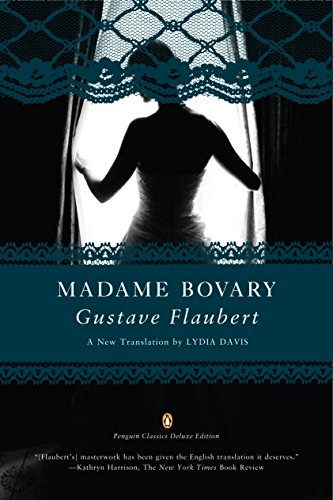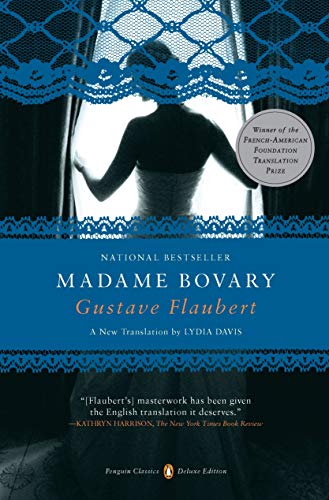Oh boy, I have a lot to say about this one! Ever wondered what happens when someone’s head is full of romance novels, but their real life is all debt, mud, and nosy neighbors? Well, you’ve come to the right place because this is my review of Bovary. Grab your imaginary monocle and maybe a pastry, because we’re about to look at tricky love, big dreams, and the messes that follow. Trust me, I’ve read it, argued about it with my book club (they still blame me for picking it), and got more than a few eye-rolls from friends when I wouldn’t shut up about Emma. Let’s see if you’ll love her or want to throw the book across the room—or maybe both, like I did!
In a nutsheel
Alright, let’s get to it. Madame Bovary is a classic novel by Gustave Flaubert. It belongs in the world of literary fiction, with a little sprinkle of drama and tragedy. This book follows Emma, a woman with a wild imagination and a hunger for excitement that her small-town life just can’t fill.
The story explores big themes like love, dreams, and the struggle to find happiness. Flaubert gets right into how boredom and society’s rules can box people in. If you like stories about real people facing real problems (and making some messy choices along the way), this one is for you. No spoilers—just know it’s a bumpy ride.
Why Emma Bovary is a Hot Mess and We Can’t Look Away
Emma Bovary is like that friend who keeps making dumpster-fire choices, but you can’t help rooting for anyway. She’s the star of ‘Bovary,’ and boy, does she love drama. Emma dreams big—like, castle-in-the-sky big. She reads too many romance books (ironically, not book reviews like mine), gets bored with her nice but dull husband, and tries to chase thrills in all the wrong places. Her life turns into a soap opera, with wild shopping sprees and even wilder affairs. And yet, you finish a chapter and think, “Hey, I kind of get her.”
What I find both maddening and fascinating is her knack for self-sabotage. Emma jumps from one fantasy to another, hoping someone or something will rescue her from her own boredom. Spoiler alert: It doesn’t go well. In my book club, half my friends call her a narcissist, while the other half say she’s just unlucky and stuck. Honestly, I see both. She’s selfish, sure, but also a product of her world—small-town France, where everyone seems allergic to excitement. I can’t say I agree with her choices (my credit card bill is scary enough without buying gold-plated hairbrushes), but I get why she looks for more.
It’s this mix of flaws, hope, and terrible life skills that makes Emma Bovary unforgettable. She might frustrate you, but you never forget her. Next up, let’s see what magic Gustave Flaubert brings to the party with his wicked writing chops!
The Magic of Flaubert: Style and Lasting Impact
Okay, let’s talk about Gustave Flaubert’s writing. When I first read Bovary, I had to wonder if Flaubert was secretly judging me for my own window-shopping and daydreaming ways. The man writes like he has a microscope for human nature! His sentences are clean—no fluff, no wasted words, and no poetic babble just for the sake of it. Flaubert believed in le mot juste (which makes me sound fancy, but really just means he picked the right word every time). And you feel it as you read. Every page feels polished and exact, like he sandpapered each one by hand.
What’s wild is that Flaubert’s style changed how other writers wrote. Before him, lots of novels liked to wander, ramble, and overshare. After Bovary, everybody wanted to be clear, sharp, and sneaky with their sarcasm. You see his fingerprints on writers like James Joyce and Virginia Woolf—even if they take it in different directions. Flaubert’s focus on showing life exactly as it is (warts and all, like my first pancake attempt) helped kickstart modern realism. He doesn’t just write, he paints with words, somehow making a soup tasting or a miserable marriage feel important.
So, as Flaubert works his magic with words, he also lets us peek behind the curtains of provincial life—I’ll unpack the drama of 19th-century French society next, and don’t worry, I’ll leave my beret at home!
How “Bovary” Paints a Picture of 19th-Century French Society
Okay, you know a novel is good when you can almost smell the baguettes and hear the gossip from Madame Lefrançois’s inn. Gustave Flaubert’s Bovary does not mess around when it comes to showing off the quirks and oddities of 19th-century French life. The book is like a time machine, but instead of gears and dials, it runs on petty squabbles and awkward dinner parties.
In Yonville-l’Abbaye—the sleepy village where most of the story unfolds—every character seems wrapped up in their own little world. You get to watch the town doctor, the priest, the pharmacist, and even the chatty tradesfolk, each with their own opinions about what counts as proper behavior. The social order is as stiff as a day-old croissant, and if you step out of line (like Emma Bovary does), everyone notices. People talk. A LOT.
Bovary’s adventures, or should I say misadventures, clash hard with the town’s stuffy routines and expectations. She dreams of fancy balls, passion, and high society, but all she gets is small-town gossip and bad dinners. You really feel for her when the excitement she craves just doesn’t exist in her world. The book pokes fun at the pride and rules of the day while also showing how those very rules squash hopes, dreams, and, apparently, the fun.
So, if you’ve ever felt out of place at a party, this book will make you feel right at home. Next up, let’s see how all this boredom and daydreaming leads Emma into the wild battlefields of love and escape!
Themes of Love, Boredom, and Escape in Bovary
Let’s get right to the messy love triangle—or square, honestly—in Bovary. Emma Bovary’s heart flops around more than a goldfish on a table. She dreams of grand passion, writes letters, and even risks it all for a spark. The problem? Emma marries Charles, who is as exciting as plain toast. (Sorry, Charles, but it’s true.) Her search for love is wild, reckless, and a little sad, but man, does she keep trying! If you’ve ever watched soap operas and thought, “Just talk to each other!” you’ll relate.
Boredom is the shadow that follows Emma Bovary everywhere. Life in 19th-century Yonville offers as much fun as a tax audit. She tries reading romance novels, buying expensive clothes, and shopping like it’s Black Friday every day. Nothing works. If you’ve ever felt like you’re stuck on a slow-loading internet page, you know her pain.
Escape is Emma’s secret ingredient. She daydreams with her nose stuck in fancy books and schemes to run off with men who barely know her favorite color. Sometimes it’s love, sometimes it’s a desperate sprint away from boredom. Either way, Emma’s escapes never go as planned. (Shocking, right?)
Bovary is as much about the wild swings of love as it is about shutting the window on boredom and trying to jump out. That makes Emma a real person, not just a heroine on a pedestal. I recommend this book for anyone who enjoys messy, real, bite-your-nails kind of drama. Flaubert’s writing will grab you by your feelings—and maybe make you second-guess your next shopping trip.
Conclusion
Well, that’s a wrap for my review of Bovary. Flaubert gives us a wild ride with Emma’s blunders and dreams—honestly, she’s a mess, but I mean that in the best way. I laughed, I cringed, and I wondered if I should move to the French countryside or just stay home with my cat. The book nails drama, small-town gossip, and the danger of wanting more. The writing is sharp, the characters are never boring, and the themes stuck with me (like the time I tried a new hairdo and instantly regretted it—Emma, I get you). Sure, the pacing can drag, and I rolled my eyes once or twice, but it’s a classic for good reason. If you love honest looks at messy lives, Bovary is your jam. Thanks for sticking around for my review—now go read the book before someone spoils the ending!



